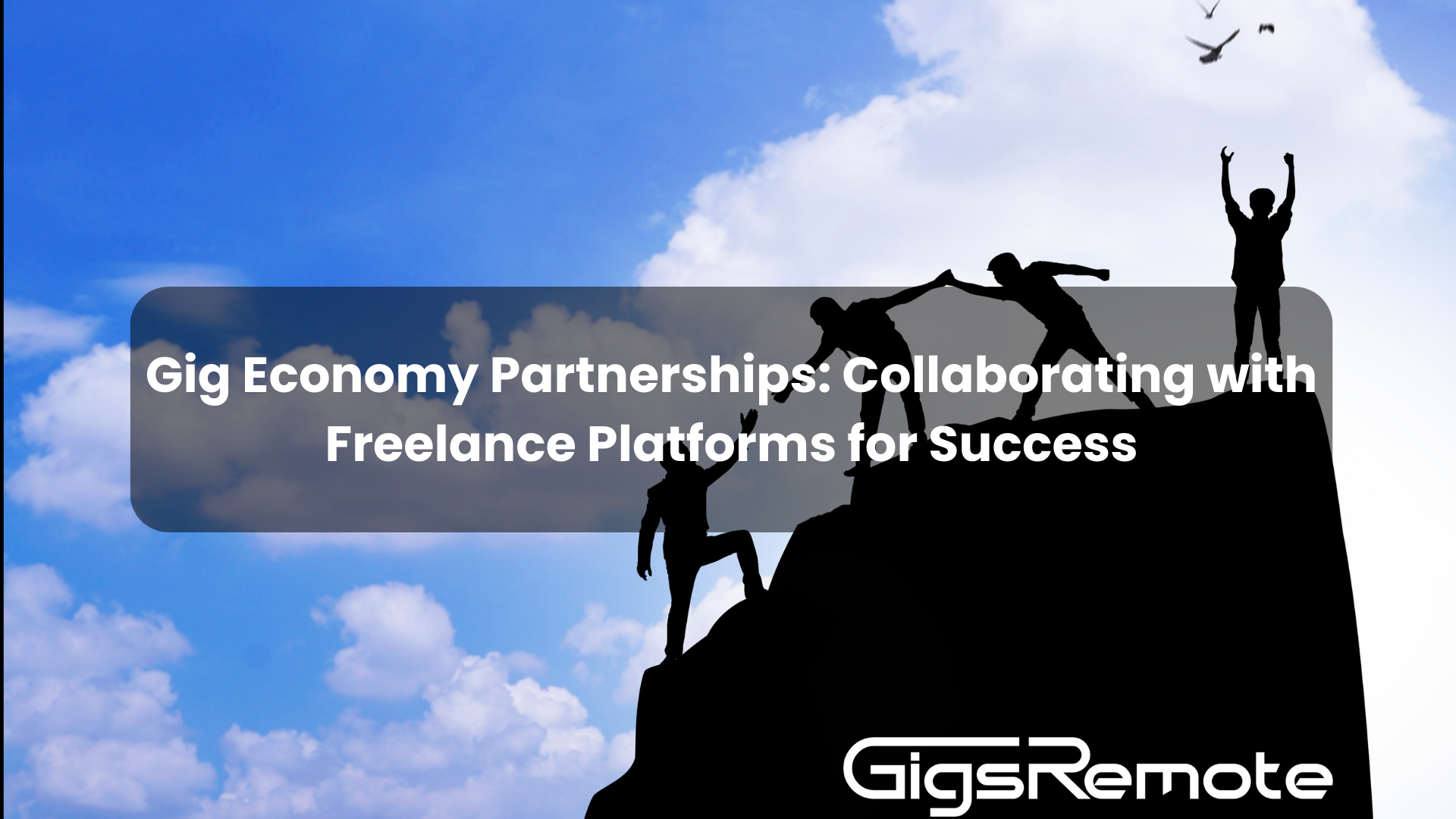Gig Economy Partnerships: Collaborating with Freelance Platforms for Success
The gig economy is a term that describes the phenomenon of people working independently, on a short-term or project basis, through digital platforms that connect them with customers. The gig economy is not a new concept, but it has grown rapidly in recent years, thanks to the advancement of technology, the changing preferences of workers and consumers, and the impact of the COVID-19 pandemic.

According to a report by McKinsey, there are about 162 million people in the US and Europe who engage in some form of independent work, either as their primary or secondary source of income. The gig economy offers many benefits for both workers and businesses, such as flexibility, autonomy, diversity, innovation, and cost-efficiency.
However, the gig economy also poses some challenges, such as the lack of social protection, the uncertainty of income, the isolation of workers, and the difficulty of control. Therefore, it is important for both parties to find ways to collaborate effectively and create a win-win situation.
One of the ways to achieve this is by partnering with gig platforms and marketplaces that specialize in connecting gig workers with businesses that need their skills and services. These platforms and marketplaces can provide various advantages for both gig workers and businesses. There are multiple things you need to consider when choosing your freelance platform partner, here are some of them:
Access to a large and diverse pool of talent

Gig platforms and marketplaces can help businesses find the right talent for their projects at the right time, from a wide range of fields and locations. With remote delivery, some platforms provide access to global talent. You can hire people from anywhere. The pool of talent accessible is bigger than your local market. But this also comes with specifics you need to be aware of.
What to consider: global platforms may provide very diverse offers. You need to be aware of the local specifics of the options the platforms provide you. For example, hiring a software engineer from South America, Europe, and Asia can come at different price ranges and different mindsets, cultural specifics, and performance. Before engaging with a platform think about all parameters of your search like time zone, the quantity of the work you need to be completed, the quality of the freelancers, local mindset and work specifics, price range and budget, internal processes and mindset towards contractors, etc. When selecting your platform partner the best one with stand-out with deep knowledge of all these factors so they can consult and point you towards the best offering.
Quality assurance and feedback mechanisms

Freelance and gig platforms and marketplaces can only assist with the quality of the work delivered by gig workers, but they can provide feedback and ratings for both workers and businesses. For example, a platform like Fiverr has a system of reviews, ratings, and levels that indicate the reputation and performance of the gig workers. Some platforms offer resolution services to handle disputes and refunds. Likewise, a platform like TaskRabbit has a system of background checks, insurance, and customer support that protects the safety and satisfaction of the customers and the gig workers.
What to consider: Freelance and gig platforms are limited in the daily quality performance of the freelancers. They can provide mediation services, make sure to get accurate reputation checks from both clients and freelancers and provide additional communication channels for feedback. The best quality indicator starts with the matching process. A good gig platform would have a mechanism for digging into great details of your request, whether through a website or follow-up calls. The better the matching, the lower the chances for bad quality. If the freelancer is the best fit for the job, success comes with the best effort from the freelancer. Consider these platforms as your search mechanism in the great pool of talent. You need to be aware of all your specific to the job which you need to be completed. They will help you reach the right talent, but the final decision and check procedure is yours. Make sure you work with a platform, which provides the option for an interview before hiring. A great bonus is a platform with a short trial period. Usually around 10 work days or a week for longer engagements.
Payment security and convenience

Gig platforms and marketplaces can help facilitate the payment process between gig workers and businesses, and provide security and convenience for both parties. For example, a platform like PayPal has a feature called PayPal for Marketplaces that enables gig platforms and marketplaces to accept and distribute payments from customers to gig workers and also offers protection and dispute resolution services. Similarly, a platform like Stripe has a feature called Stripe Connect that enables gig platforms and marketplaces to create and manage accounts for gig workers and also offers compliance and reporting tools.
What to consider: Not all businesses are flexible with payments to PayPal, Stripe, Revolute, or another instant or modern payment option. The majority of the world runs on verified bank transactions. Make sure your platform partner covers standard payment methods. Get interested in the way they settle their payments with freelancers if the platform is a payment mediator. It is an extra mechanism for identity fraud detection if this is done via standard banking.
Another thing to consider is the flexibility of payment terms. Although self-entrepreneurs freelancers usually don’t have dozens of income streams. In most cases, they do up to two or three projects at a time. Especially if they engage in long-term projects they limit it to one. This mode of delivery and operation requires for them to be very careful of the payment terms they agree with. The shorter for them, the better and happier they will be.
Training and development opportunities

Gig platforms and marketplaces can help provide training and development opportunities for gig workers, and help them improve their skills and competencies. For example, a platform like Coursera has a feature called Coursera for Business that enables gig platforms and marketplaces to offer courses and certificates to gig workers and also track their progress and performance. Likewise, a platform like Udemy has a feature called Udemy for Business that enables gig platforms and marketplaces to create and customize learning paths for gig workers, and also measure their impact and ROI.
What to consider: Your platform partner should have community development and mentorship programs. Other options are to have partnerships with specific businesses (like the ones mentioned above) where freelancers get discounts or special offers for going through certifications or training. Giving back to the community should be one of the greater goals of each freelance platform.
Flexible engagement models

Different platforms provide different ways to onboard and engage with freelancers. For example, a business that needs a logo design can use a platform like 99designs to launch a contest and receive dozens of proposals from designers around the world. There are also options to get quotations for a fixed scope and price delivery. Other platforms provide the options for personalized matching and search, based on detailed criteria, sometimes including matching via Artificial Intelligence algorithms. This engagement type makes sure you connect with the best talent fit for your project. Some platforms are open to view freelancers’ profiles, so you can choose from, them based on the way they presented themselves and their expertise.
What to consider: Know your preferred engagement model. Explore all existing options, but choose a partner which can deliver the model that works best for you. Not all gig platforms are suitable for fixed-scope and fixed-price projects. Usually, this is a model for smaller projects and short-term engagements. Full-time or long-term engagements follow the time and materials engagement.
Consider also what external talent means for you. If it is more of a capacity problem you are solving and you don’t need extraordinary performance you may rely on an automated matching mechanism. But if you are focused on finding great talent it is best to work with a partner, which will handpick the freelancers, based on your detailed requirements.
Flexible pricing models

Most platforms have flexible pricing models. A lot of them offer the flexibility to start paying for the services of the freelancers as actual work started or was delivered by the freelancer. Others have chosen the pricing model closer to the traditional recruitment companies with specific fees paid per successful match. There is real diversifications in the pricing model, so you need to choose the one that suits you best.
What to consider: Be aware of multiple fees and complex pricing models from the platforms. Your partners should have a straightforward pricing policy, easy to understand and put into practice. In the best scenario, you would know the rate for the services as an end price, including all services provided by the platform. Some freelance platforms have percentage-based models, some have flat-fee models. Usually, the second one is preferred more by freelancers and it also proves to provide better long-term value for clients.
Identity fraud

There is a serious challenge that needs to be addressed in the gig economy: identity fraud. Identity fraud is a growing concern that affects both businesses and customers. Fraudsters now have easier access to more tools and data than ever before, causing identity theft to reach a record high. According to a report by TransUnion, nearly one in four (24%) Americans have been victimized by fraud or identity theft while using gig economy platforms, like delivery and ride-sharing apps. That is more than double the rate they experienced elsewhere, with only 10% reporting victimization outside gig platforms.
In the latest years, well-paid remote positions have been in the interest of fraudsters. So you need to be very careful with tapping the gig economy when it comes to hiring the right and actual freelancer.
Identity fraud can have serious consequences for both gig workers and businesses:
- Loss of income and reputation: Gig workers who have their identity stolen may lose their earnings, their ratings, and their access to gig platforms and marketplaces. They may also face legal issues and damage to their personal brand. Businesses that hire fraudulent gig workers may lose money, time, and quality. They may also face customer complaints, negative reviews, and legal liabilities.
- Loss of trust and security: Identity fraud can undermine the trust and security that are essential for the gig economy to function. Customers may lose confidence in the gig platforms and marketplaces and may switch to other providers or avoid using gig services altogether. Gig workers may lose trust in the gig platforms and marketplaces, and may seek other sources of income or demand more protection and verification.
Therefore, it is crucial for gig platforms and marketplaces to implement effective measures to prevent and combat identity fraud. Some of the measures that can be taken are:
- Identity verification and authentication: Gig platforms and marketplaces can use various methods to verify and authenticate the identity of gig workers and customers, such as one-time passcodes, biometric identity verifications, like facial recognition and fingerprint scanning, and document verification, like driver’s license and passport scanning. These methods can help ensure that the person who signs up, works, and pays is who they claim to be.
- Fraud detection and prevention: Gig platforms and marketplaces can use various tools and techniques to detect and prevent fraud, such as artificial intelligence, machine learning, behavioral analytics, and risk scoring. These tools and techniques can help identify and flag suspicious or fraudulent activities, such as multiple accounts, fake reviews, chargebacks, and account takeovers. They can also help block or suspend fraudulent accounts, and alert or notify the affected parties.
- Fraud education and awareness: Gig platforms and marketplaces can use various channels and resources to educate and raise awareness among gig workers and customers about the risks and signs of identity fraud, such as emails, blogs, videos, webinars, and podcasts. They can also provide tips and best practices on how to protect their identity and data, such as using strong passwords, enabling two-factor authentication, and avoiding phishing emails and links.
Long-term partnership

Although the gig economy and freelancing are most popular for shorter-term engagements you should always look at it from the long-term perspective. Some of the benefits of long-term partnership are:
- Loyalty and retention: Long-term partnerships can foster loyalty and retention among gig workers and businesses, as they can build rapport, trust, and mutual understanding over time. They can also benefit from repeat business, referrals, and word-of-mouth. Long-term partnerships can also reduce the costs and risks of hiring new gig workers. If your freelance platform partner is well acquainted with your needs matching would be faster and of better quality. But to achieve this you need to be patient for the long-term results as well.
- Knowledge availability: Consider a permanent employee leaving and the chances of getting them to help you with some knowledge transfer after they’ve left. There is a very slim chance that they’ve already found another labor contract engagement. If the separation was not on the best terms the chances are zero. By design, freelancers are open to coming back and providing assistance on a short-term basis. Separation in gig projects is expected and set from the very beginning, so you rarely have bad feelings from this perspective.
- Growth and innovation: Long-term partnerships can enable growth and innovation among gig platforms, freelancers, and businesses, as they can learn from each other, share feedback, and co-create solutions. Freelance platforms can often advise for the right freelancers who would add specific value to your projects even if they don’t seem to be the best candidates, but having long-term knowledge of their capabilities would change things. Especially with cross-domain knowledge. They can also leverage each other’s networks, resources, and expertise. Long-term partnerships can also increase the quality and value of the work delivered and received.
It is advisable for freelance platforms, gig workers, and businesses to seek and maintain a long-term partnership in the gig economy, when possible and appropriate. Some of the ways to achieve this are:
- Communication and feedback: Gig workers and businesses should communicate and provide feedback regularly and effectively, especially with the freelance platform partner. They should also express their expectations, needs, and goals clearly and respectfully, and address any issues or concerns promptly and constructively. The gig platform partner is there to assist, facilitate, and mediate these processes.
- Recognition and appreciation: All parties should recognize and appreciate each other’s work and contributions, using the appropriate forms and gestures of each party. They should also reward and incentivize each other’s performance and loyalty, using the suitable means and measures of each party. Your freelance platform partner should be there to assist in finding a good way to handle recognition and appreciation.
- Commitment and reliability: Everyone should commit and deliver on their promises and obligations, using the agreed standards and deadlines. They should also be reliable and consistent in their work and behavior, and avoid any actions or situations that may compromise their trust and reputation. Especially important is the mediation of the freelance platform partner in this regard.
In conclusion, the gig economy is a dynamic and diverse phenomenon that offers many opportunities and challenges for freelancers and businesses. By partnering with the right gig platforms or marketplaces, they can access a large and diverse pool of talent, ensure quality assurance and feedback, facilitate payment security and convenience, and provide training and development opportunities. By preventing and combating identity fraud, they can enhance trust and security, and avoid loss of income and reputation. By seeking and maintaining long-term partnerships, they can foster loyalty and retention, enable growth and innovation, and offer flexibility and stability. Therefore, gig economy partnerships can be a key factor for the success of both gig workers and businesses in the future.
GigsRemote is here for the long run! Matching you with the best technology freelancers from Eastern Europe.
We stand for fast engagement of preselected technology freelancers from Eastern Europe under a single contractual framework and no upfront hiring fees.
If you are considering working with tech freelancers from Eastern Europe make sure to get in touch with us. We will be glad to listen to your story and needs and help connect you with the best fit for your case.



